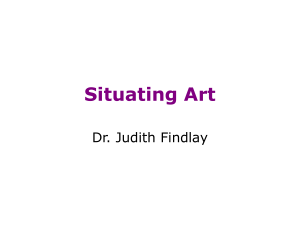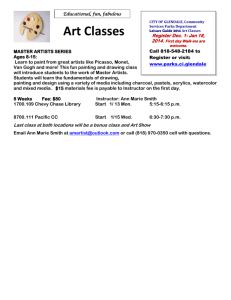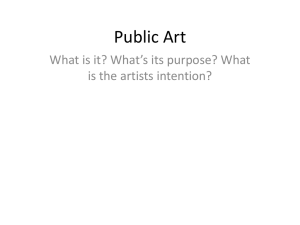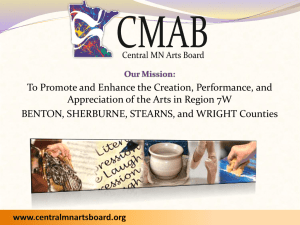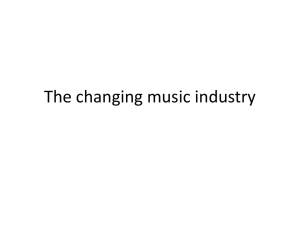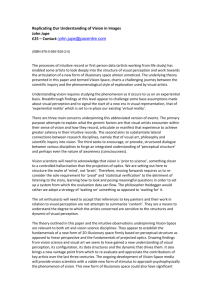Word 37.5 KB - Arts Council England
advertisement
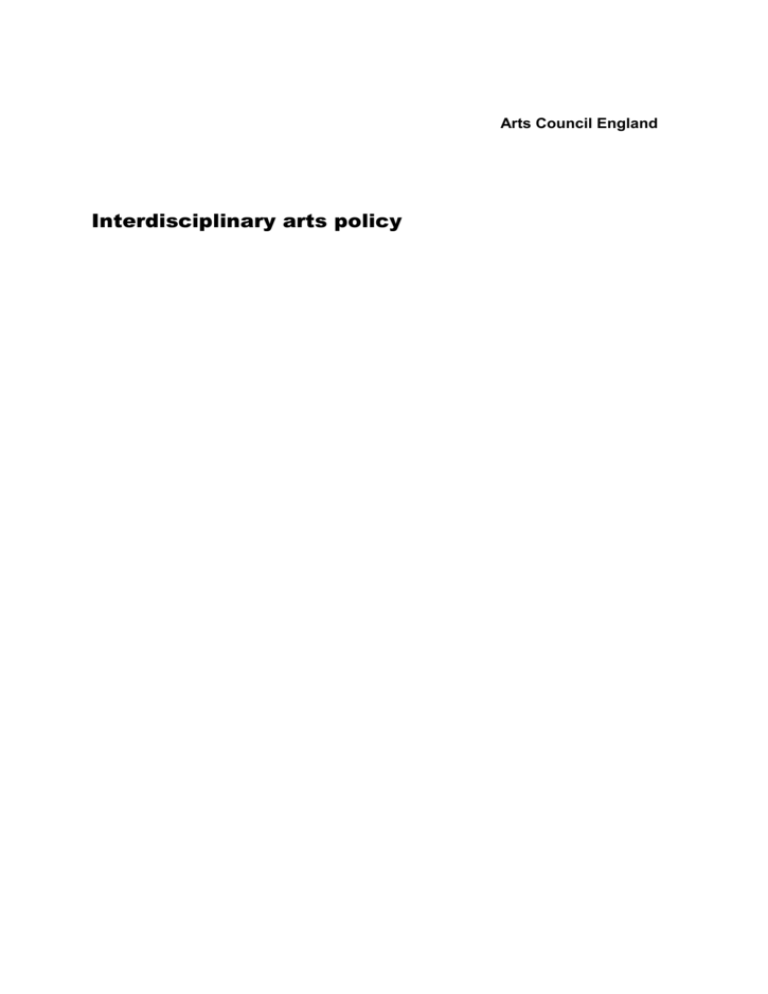
Arts Council England Interdisciplinary arts policy Introduction We will support the development of interdisciplinary arts in order to achieve our ambition of putting the arts at the heart of national life and people at the heart of the arts. This means enabling artists and arts organisations to take creative risks and pursue new opportunities. Our policy summarises the context for interdisciplinary arts and the Arts Council’s role. It sets out our vision for interdisciplinary arts and the priorities we have set to help us deliver it. All our arts policies prioritise strengthening and developing the infrastructure for the artform. They identify particular areas of contemporary practice that we want to help develop. They confirm our support for individual artists. Collectively the policies will help us deliver the six areas of our agenda for the arts: taking part in the arts, children and young people, the creative economy, vibrant communities, internationalism and celebrating diversity. We are prepared to make choices – sometimes tough ones – about how we commit our funding to respond to the kind of ambitious thinking and high quality work that will take our priorities forward. We believe they will help us develop a confident, diverse and innovative interdisciplinary arts sector that is valued by and in tune with the communities it serves. 1 The context for interdisciplinary arts and the role we play Many interdisciplinary artists and arts organisations position their work within the wider context of the creative industries. Increasingly they are working with other disciplines, moving easily between the subsidised and commercial sectors. These artists and production agencies are often the pioneers whose creativity creates investment and jobs for others. At the same time, there is an increasing desire among many artists and cultural practitioners to engage with contemporary issues that lie beyond the traditional borders of the arts. Placing themselves in other disciplines such as science, ecology, anthropology, health, industry or philosophy, these artists are seeking to address some of the most pressing issues of our time – climate change, for example. These artists often work on an international stage using new media to distribute their product. They bring perspectives that are different to those of scientists, politicians and other problem solvers and they bring a reflective and questioning approach to big issues. They add value and their personalised response can engage a wide audience in ‘difficult’ subjects. Arts Council England supports many forms of emerging arts practice and artists and creative producers who cross boundaries, build audiences and encourage participation. We recognise the opportunities for creativity that artists open up when they work with those from other sectors. Mixing ideas, skills and experience is increasingly important in all areas of life, in scientific research, in business and the cultural industries. Technology is a key factor in the development of interdisciplinary art. Low-cost technology is offering new opportunities for rapid exchanges of views, ideas and content as well as new business models, new opportunities for marketing and promotion, and above all the potential for creating and reaching new audiences. This in turn is placing more value on collaboration and networking and new forms of distribution. Marshall McLuhan’s vision of the ‘user as creator’ has finally come of age. Digitisation is challenging conventional notions of intellectual property as it opens new opportunities for the remixing and re-presentation of existing material. As yet there is no code of practice relating to the law, intellectual property rights and these new forms of creativity. 2 Arts Council England has a key role to play as the supporter of new talent, a catalyst for research and development, the recorder of best practice, and the broker of partnerships between artists and arts organisations and other agencies and sectors. 3 Our vision for interdisciplinary arts We want artists and creative organisations to have the opportunity to engage with partners in other disciplines to address contemporary issues. We believe they bring a perspective that will enable more people to engage with the big issues of our time. We want to support interdisciplinary artists and organisations and encourage a new generation of creative producers to combine research and development with innovative production and distribution facilities. We will support research and development programmes that bring together artists and other partners to look at key issues such as the environment, climate change, urbanisation, landscape and sustainable developments. We want to help support the kind of environment in which interdisciplinary artists can develop new practice and produce work of the very highest quality and influence. We will respond to the needs of artists who want to move between disciplines and we will help develop an environment in which they can develop sustainable careers. This means putting in place opportunities for financial support and a range of professional development opportunities both national and international. We recognise the important role that artists can play in generating debate and tackling important global issues. We believe that artists should have a place at more of the key events where conversation and decision making on matters of international importance takes place. We will work with partners beyond the arts to raise the profile of interdisciplinary activities and to help generate debate. We will continue to support interdisciplinary dialogues with social scientists, anthropologists and ethnographers to chart the patterns of behaviour emerging within new media and art and science contexts regionally, nationally and internationally. We want artists and arts organisations to continue to break new ground and contribute to the wider creative economy. We will support partnerships with sectors such as the mobile phone industry, computer science, games, software, interactive media and other research and development labs. We will continue to build on our programme of artists in industry placement, developing models of good practice and skills exchange and looking at issues that concern the wider creative industries. 4 We recognise that artists are engaging with the law in many different ways as they develop new forms of practice and distribution. We believe that there should be a code of good practice for artists and the layperson and we will work with partners to develop this. We believe that this will be welcomed by artists and make a contribution to the government’s developing approach to innovation and the creative industries. We believe that the aspirations of creative practitioners should be represented in policy contexts such as the Government’s Creative Economy Programme, and the Creative Industries and Higher Education Forum. We want artists to be included in knowledge transfer programmes led by the Department of Trade and Industry, the Arts and Humanities Research Council and others. We will advocate for this. We see many opportunities for artistic involvement in urban and rural development contexts and we will seek to develop our partnerships with commercial property developers and arts and business. We will develop a series of placements for artists to work in the heart of communities. We will also produce tools and guidelines to enable artists and industry to work more closely together on the development of communities. 5 Our priorities for interdisciplinary arts 2007–2011 To support a more confident, diverse and innovative arts sector, which is valued by and in tune with the communities it serves We will fund a portfolio of organisations that are contemporary in their approach and committed to engaging people in their work in new ways. We will continue to review the organisations we fund. We will prioritise emerging practice and new organisational models We will support artists to work across disciplines. We will support opportunities for artists to work in other contexts such as science, industry, research and development, community and sustainable community contexts both here and abroad To enable more people to take part in the arts as both audiences and participants We will raise the profile of interdisciplinary arts and engage a wider audience. We will work with partners to support initiatives that demonstrate the role that artists play in generating debate and 2011addressing the key issues that face society today. We will devise events and initiatives that highlight interdisciplinary working. We will prioritise initiatives that use technology to reach a wider audience To contribute to the development of the creative economy We will help build links between art and industry. We will support the development and publication of models of good practice for skills exchange and knowledge transfer. We will develop legal contracts which facilitate interdisciplinary collaboration and which can be used by others To help create vibrant communities across the country We will develop the impact of interdisciplinary arts in the wider community. We will prioritise opportunities for artists to work in the fields of ecology and science, particularly where their work is likely to influence educational activity or contribute to regeneration projects 6 Arts Council England 14 Great Peter Street London SW1P 3NQ www.artscouncil.org.uk Email: enquiries@artscouncil.org.uk Phone: 0845 300 6200 Textphone: 020 7973 6564 Charity registration number 1036733 You can get this publication in Braille, large print, audio CD and electronic formats. Please contact us if you need any of these formats. To download this document, or for the full list of Arts Council publications, see www.artscouncil.org.uk Order our publications from Marston Book Services. Phone: 01235 465500 Email: direct.orders@marston.co.uk ISBN: 0-7287-1308-X, 978-0-7287-1308-6 Printed on paper comprising at least 75% post-consumer waste. ©Arts Council England, November 2006 We are committed to being open and accessible. We welcome all comments on our work. Please send these to Andrew Whyte, Executive Director, Advocacy and Communications, at the Arts Council England address above.
